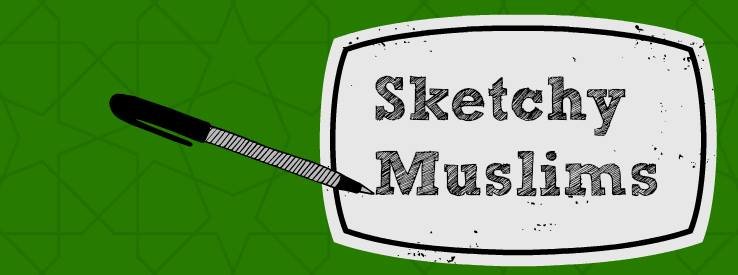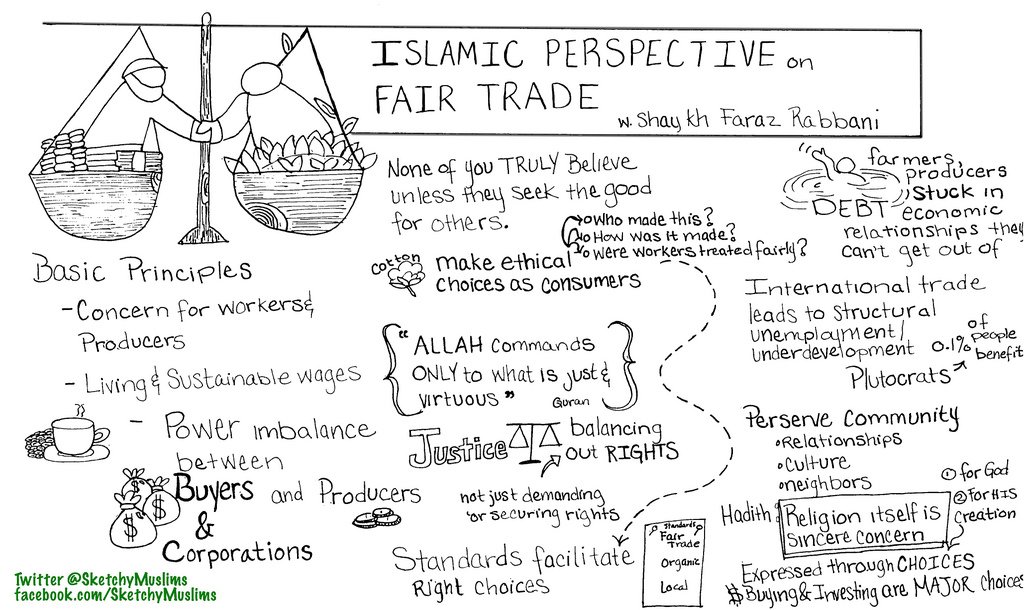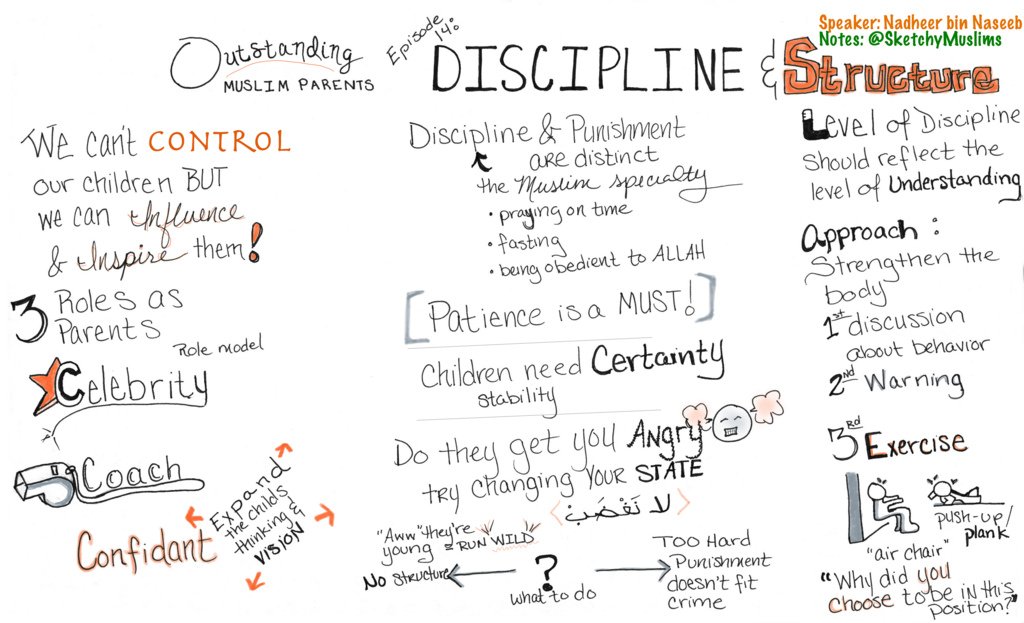[Interview] Umm Sultan on creating 'Sketchy Muslims' and the art and benefits of sketchnoting

While written notes can form a good reference in various situations, the art of sketch noting has increased in popularity in recent years. Combined with its visual appeal and informative content, to being the first online space for "sketchnoters" in the Islamic community, Sketchy Muslims is definitely one interesting platform that stands out in developing and popularizing this creative art form.
Developed in 2013 by Umm Sultan, Sketchy Muslims is an online space where its founder and other "Sketchy Muslims", create and share everything from Islamic lectures and events to personal enrichment and general advice.
I talk to Umm Sultan: sketch noter, idea-junkie and "aspiring mumpreneaur", about what triggered her interest in becoming a sketch noter, the benefits and challenges associated with Islamic sketch noting, and her interesting plans and aspirations for the future.
Tell us about the inspiration behind Sketchy Muslims. How did it first come about? What have you achieved so far?
“I actually didn’t intend to be a sketchnoter. In October of 2012, I took a class in graphic recording, which is similar to sketchnoting but generally done live on huge 4 by 6 ft paper for groups at strategic planning meetings, retreats, conferences, etc.This past October, I enrolled in a Seekers Guidance course, and decided that I wanted to practice my visual thinking by sketching my course notes. After taking some notes in the course, I wanted to share them because I thought that other people might benefit from them.The problem was that there really wasn’t anywhere for me to post them. I didn’t want to use my personal social media profiles, and Islamographic, which I love, is for more polished work generally done by people with graphic design skills. So I decided to create an online space where I and other “Sketchy Muslims” could share our notes. Pluralizing Muslims was very intentional as I never wanted to just create a place to showcase my own work but more so a community where I could curate notes and share information relevant to sketchnoting.”
In what situations can we use and create sketch notes?
“I’ve seen people use sketchnotes in all sorts of situations. I’ve seen some pretty cool sketchy recipes online, which I think would make a great Eid gift.In general though, sketchnotes are appropriate in any situation where you would generally take notes; so when reading books, listening to lectures, taking a class, even at meetings.”
What tools and skills are needed for sketch-noting? Does one have to be an artist to sketch note?
“You absolutely don’t need to be an artist. In fact sometimes being a “real” artist can get in the way of sketchnoting. Especially in real-time situations you don’t have time for the level of perfection that you would in art.I don’t consider myself an artist. When I first started learning about all of the benefits of visual thinking/note taking I didn’t really think I could draw well. With practice I’ve gotten better, ma sha Allah, but I’m still no Picasso.
“Sketch notes are appropriate in any situation where you would generally take notes; so when reading books, listening to lectures, taking a class, even at meetings.”
I use Google Images or The Noun Project when I need inspiration, you can usually find simple clip art that captures what you want to get across. Drawing with a picture to reference is MUCH easier than trying to draw something just from memory.In terms of tools and skills, really nothing special. Blank paper helps, and I prefer a black felt tip pen. You have pen and paper enthusiasts who swear by particular brands but they really aren’t necessary to get started. As long as you can write legibly and draw simple shapes you have what you need to get started.!
What are the themes and topics that you normally undertake when doing sketch notes, and how does it benefit you?
“Right now my sketchnoting is focused on a variety of Islamic topics. I generally take notes on classes, or lectures I’m watching for my personal enrichment, or speakers I really enjoy.So far there hasn’t really been a rhyme or reason behind what I’ve taken notes on. My list of speeches and speakers that I want to take notes on is steadily growing, as there is so much great content available online. In sha Allah as I start more focused courses of study my notes will reflect that.Regarding how sketchnoting has benefitted me personally I’d say definitely focus. Prior to me starting to sketch lectures I’d often have them playing in the background while trying to multitask. I’d be driving, cooking, taking care of my children, etc.Now that I am intentional about taking notes I try to only listen to lectures when I can sit down and give them my full attention. This forces me to set aside quiet time just for my Islamic studies, where I can really focus. Being able to draw while doing that is a bonus! After a long day with the kids now I look forward to that time when I can just break out my markers and listen to something beneficial.”
How many sketch notes have been completed till date? What are the themes/topics covered?
“I think I’ve done around 20 lectures so far, many of them have multiple pages of notes so I guess it looks like more. The themes are pretty broad gratitude, self-reflection, rasing huffadh, etc.”
What was your first sketch note? Could you share that with us, and your best sketch notes to date?
“Prior to sketching Islamic lectures, I was watching a lot of online webinars/telesummits geared towards creatives in business. I started out just doing sketch quotes of a memorable sound byte from some of the speakers. I think my first time sketching a full Islamic video was around April 2013 when I did two of the videos from Ta’leef’s Reflection series with Ustadh Usama Canon. Before incorporating Muslims in my sketches though, I practiced by trying to redraw the character’s from Design Molvi’s Smile it’s Sunnah series in my sketchbook.My best notes to date, it’s hard to say. I’m still working on the rest of the notes from Stranger in the Night, the 4 part series on Qiyamul Layl by Shaykh Omar Suleiman. I think I really like the notes from this series because I didn’t do a lot of digital embellishing afterwards. There was so much content I didn’t really have time to add color, and I took a chance at handwriting the Arabic rather than copying and pasting it.
“You absolutely don’t need to be an artist. In fact sometimes being a “real” artist can get in the way of sketch noting...”
For myself I could feel the progression over the sessions from trying to catch everything that Shaykh Omar said, even if it was 5 ahadith illustrating the same point, to being less of a court reporter and more of a notetaker who tries to synthesize things and get to the heart of the matter. There were other people online posting extremely detailed notes so in some ways I felt it freed me up to focus on the main points rather than all of the details. That can be really difficult when listening to some lecturers though because you feel like everything they say is a gem, and you definitely don’t want to misquote or misrepresent what was said.”
Is content or visual art more important in sketch noting, and why?
“Content is DEFINITELY more important! If you get the content down you can always go back and embellish. If you are listening to a live lecture and get too caught up drawing you can miss the message.When I am listening to something live, I often take a draft version of my notes, where I focus mostly on the words. I then can use this version to practice or work out any drawings I may want to add. I then go back and do a more polished version. This is the method that I used when listening to the ISBCC khutbahs, which were live streamed.”
8) What tips would you give to fellow sketch noters, and someone who's just beginning sketch noting?
“My number number 1 tip is ajr over ego. I think the number one thing that stops people from trying sketchnoting is the feeling “I can’t draw”. However, once you realize the many benefits sketchnoting has over traditional linear notetaking in terms of helping you concentrate and improving your memory of the material you have to push past that and just try it. If you aren’t comfortable drawing try varying the style and size of the text and using lines and boxes to separate the content.Similarly, when you’ve taken sketchnotes and you don’t want to share them because “you can’t draw”, you have to consider whether your ego trumps the benefit your notes can provide to other people. In general I find people really appreciate sketchnotes regardless of how “good” the drawings are.Once you are open to trying them out, there are plenty of resources out there to help get you started, Mike Rhode’s The Sketchnote Handbook is a great one, there are also plenty of online tutorials and blogs dedicated to sketchnoting.I think the last bit with regard to ajr over ego is to just check your intentions. You don’t want to loose the benefit of a good deed by becoming primarily motivated by likes and retweets.”
Are there any challenges involved with sketch-noting and if so, how could one overcome them?
“I don’t really think there are any challenges. The biggest thing is getting out of your own way and just trying it!On second thought, there are some challenges that I feel are unique sketchnoting Islamic lectures in that there is generally a good amount of code switching. Lecturers incorporate Arabic, the language of the people they are speaking to (in my case English), and sometimes popular vernacular that helps the message resonate with the given audience. As you build your Islamic knowledge you become more familiar with the terminology, you can find most terms online if the speaker doesn’t explain them.”
How has the general response for Sketchy Muslims been so far?
“I think the response has been great. I originally started a Facebook page, but because of the changes they made even those of my friends who liked the page never saw any of the updates. Joining Twitter has definitely allowed Sketchy Muslims to reach a broader audience, which has been cool.I do hope that the people who view my notes click through and benefit from the actual lectures though. Whenever possible I try to include links to whatever I was taking notes on. I don’t want to give the impression that looking at someone’s notes is a substitute for actually listening/studying on your own.
"We should totally start a #Islamicsketchquotes hashtag!"
What are your plans for the future?
"LOTS. In sha Allah I’d like to continue to try to build a community of Muslims who sketchnote to maximize the rewards of taking and sharing notes.Right now I’m developing a notetaking system to help Muslims get more out of their Islamic studies. The fact that we have access to so much Islamic knowledge online is great, but I think not sitting with a scholar or taking an in-person classes contributes to a lack of follow through and accountability. My background is in education so I was inspired to try and develop a product that addresses some of the problems people face when they undertake Islamic studies in more informal settings. In sha Allah I hope to try to launch that in the Spring.Lastly, I’d really like to try to get to more live events in 2014 as well."
Where can our readers find your works?
"Currently, the best place to find my sketchnotes is my Flickr page. I’ve also started a Flickr group Sketchy Ummah to have a central place to gather notes from other Sketchy Muslims.I also post my work as long as tips, etc. on my Twitter and Facebook feeds."
Finally, what do you think of Sufi Comics?
"I actually really love the simple notebook sketches that I guess aren’t technically part of the comic series. I enjoy the simplicity of them, and that they are beautiful reminders that are easy to “get” within a few seconds. I also like them because I’m a budding typography nerd. They are great examples of how a sketch doesn’t need to be picture heavy in order to have a great impact.In fact, for anyone who is interested in trying sketch noting, but finds the idea of doing a full lecture intimidating, picking a meaningful quote to sketch is a great starting point. We should totally start a #Islamicsketchquotes hashtag!"Umm Sultan is a certified ESL teacher, and holds a Masters Degree in Instructional Design for Online Learning. She is also mom of two boys. Images from: Sketchy Muslims Facebook & Flickr.Check out Sufi Comics sketches hereSubscribe to our Newsletter for updates and download your Free "40 Sufi Comics" E-book today!Read about our new and upcoming book: Sufi Comics: RumiOur Books are available to buy Online: 40 Sufi Comics & Wise Fool of Baghdad